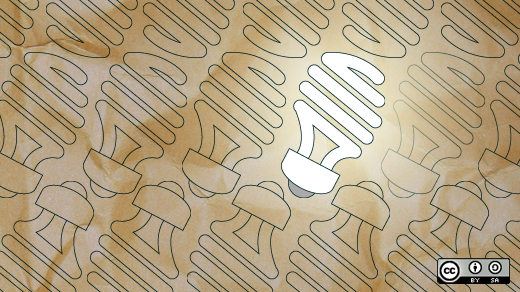I'm a newcomer to the tech industry. I don't have a degree in Computer Science or Engineering. I'm a writer by trade and training, so coming to work for Red Hat after years of freelancing and crappy office jobs was a real shock. Which is to say, a pleasant shock. Tattoos? Sure. Pink hair? Oh, yes. Start time? Whatever suits you best. And unlike other places I've worked, not a single man has expected me to make them a cup of coffee, and nobody tells me to "smile love, nobody likes a sadsack in the office!" (I frown when I concentrate. I'm sorry! And by that I mean I'm totally not sorry.)
What's more, I work in a department full of women. This was also unexpected—I'd been led to believe that women didn't work in IT, and so I came in bracing for more male-dominated office life. But there are heaps of women in my office. Well, I should qualify—heaps of women on my floor. Engineering? Not so much. There are lots more women in the "periphery" of tech, such as technical writing and business management, but engineering is still hopelessly male-dominated. Why is that?
From the Women in Technology (WiT) Education Foundation:
"In 2008, women received 57% of all undergraduate degrees but represented only 18% of all Computer and Information Sciences undergraduate degrees. There has been a 79% decline, between 2000 and 2008, in the number of incoming undergraduate women interested in majoring in Computer Science. As a result, only 27% of computer scientists today are female."
I find that really interesting. In the course of researching this piece, I read a lot of troubling stories from women in the industry. This quote from an article in Fast Company stood out to me:
"It's tiring always being first, always being different, always being the one who has to adapt, denying important parts of yourself just to get the chance to do your job. It’s like being a stranger in a strange land, where you speak the language but nobody learns yours. That's why even women who do well in development end up leaving mid-career."
What is the strange land? What is the language of the tech industry? As a newcomer, and a woman, it's immediate and noticeable, but oddly hard to articulate. It goes deeper than the plethora of buzz-words and over-determined jargon. I think it's a cultural problem, and I don't just mean in the standard "men-and-women-can't-get-along" kind of way.
I don't mean to start a fight here, but I think the tech industry, and open source in particular, is snobby. Geek culture is so deeply insinuated into every part of this industry it forms a barrier of entry to everybody already not inducted by a nearly life-long process of immersion. Just like any culture, there are acceptable and unacceptable ways to dress, shows to watch, books to read, hobbies to engage in, and modes of communication.
It's also understandable to a degree how suspicious geeks can be of non-geeks. The exclusionary nature of geek culture works both ways: mainstream society's relationship with geek culture seems to be torn between opportunistic profiteering (Big Bang Theory) and downright antagonism (every "nerd" movie trope). But an unfortunate by-product of this is a seriously insular culture that has been wrapped around the tech industry. That culture could do a lot to be more welcoming in general, but more welcoming to women specifically.
It returns to this notion of working somewhere "where you speak the language but nobody learns yours." I'm nerdy, geeky, dorky, whatever. I was the weird kid in high school. I read comic books, I play Dungeons and Dragons. I also like shoes, and handbags, and musical theatre, and I pay too much for haircuts. I bulk-bought makeup in Walmart last time I was in the States like there was an oncoming fashion apocalypse.
Despite the fact that I definitely consider myself die-hard geeky, apparently I don't fit the girl-geek stereotype—maybe geek girls don't shave their heads and get a lot of tattoos? I lack the pre-requisite shyness? (It was a long slog but I grew out of it eventually...) I'm actually not sure why I get disqualified. I own a NASA shirt! Nonetheless, I therefore run the risk of being accused of the ultimate insult against geek puritanism: the fake geek girl. I won't speak too much about this recent phenomenon, but apparently now there are girls invading the land of geekdom and appropriating cultural icons as fashion accessories without any knowledge or understanding of their history or significance. I can see how this is problematic, and there's a big debate to be had about cultural appropriation there, but automatically dismissing anyone who isn't deemed "appropriately geeky"—especially women, because this vitriol seems to be focused on women—isn't exactly going to facilitate the kind of growth most of us would like to see in open source. Authenticity should only be discussed in terms of desire to be a part of the open source community, not in terms of what clothes you wear or what books you read.
Not only do I have to constantly prove my worth as a non-technical person in a highly technical world, I also have to contend with the notion that I'm just trying to disguise myself as someone nerdy in order to fit in with the misfits. (How does that logic even work?) So I ask you, if we can't even trust women from our own highly insular culture, then how are other women ever going to feel welcome in our industry, so caught up in said culture? By failing to disrupt the narrative that entwines geek culture with IT, we're alienating everyone who already feels like IT is inaccessible, especially women.
I nominate open source particularly because even by tech industry standards, this is the hardcore stuff. When I tell other IT people I work for a Linux company even they sometimes get the haunted look of somebody about to be bombarded with a bunch of stuff they don't know or care about. I really like it though. I like the passion people have. I like that innovation and progress are the big markers of success, and that good ideas are going to naturally work their way to the top. This sort of natural selection shouldn't be limited by who can produce some geek cred. I know it's worn like a badge of pride, but it shouldn't devalue other social structures, especially feminine social structures, in the process.
It's got to be hard to have the best ideas when we're missing a huge chunk of the population. Imagine how many brilliant potential software engineers are being lost to other industries because they feel like there isn't any space for pink high heels in IT? Should femininity be a foreign language barrier that women need to overcome in order to have a career? And why should women have to prove their geekiness even when it is genuine? We need to better delineate between the tech industry and geek culture, because ultimately, being snobby in open source is bad for business.
View the complete collection of Women in Open Source Week articles.








65 Comments